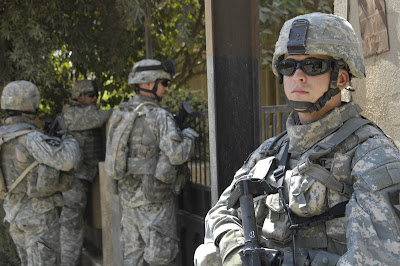 U.S. Army Pvt. Joseph M. Dement (right) provides security in the city of Dora in Southern Baghdad, Iraq, on Sept. 20, 2007.
U.S. Army Pvt. Joseph M. Dement (right) provides security in the city of Dora in Southern Baghdad, Iraq, on Sept. 20, 2007. Coalition offensives in southern Baghdad, spurred by Iraqi intelligence, have dramatically reduced al Qaeda-inspired violence, a military commander said on Friday.
“We’ve had about a 60-percent reduction in murders since we arrived and took over in March,” Army Col. Ricky Gibbs told online journalists and “bloggers” during a conference call from Iraq. “That’s huge.”
Gibbs commands the 4th Infantry Brigade Combat Team “Dragons” of 1st Infantry Division, part of Multinational Division Baghdad, deployed from Fort Riley, Kan. His soldiers patrol the Rashid district in southern Baghdad, where al Qaeda insurgents have sought to establish a base, Gibbs explained.
“We’ve had great success,” the colonel said of operations Dragon Hammer, Dragon Fire, and now Dragon Talon II.
The current mission is focused specifically on the southeastern part of the Dora neighborhood, which is particularly ripe for al Qaeda infestation, Gibbs explained. So far, 24 caches filled with weapons and explosives have been discovered, and 102 suspected insurgents have been arrested, including 17 “high value targets” who finance, lead and organize al Qaeda operations, the colonel said.
“We have also been able to cut down dramatically the numbers of IEDs that were in our area,” Gibbs said.
Just last night, the colonel elaborated, his soldiers seized 36 rockets and two mortar systems similar to those that are sometimes fired into Baghdad’s heavily fortified International Zone.
“One of the things that is helping us is the people,” Gibbs said. “They trust the American soldier. They seek out the American soldier and give him tips.”
A classic case of citizen assistance happened just today when a coalition patrol was warned of potential danger by Iraqi children waving and shouting from a roof top, the colonel explained.
“That’s one very simple example of the Iraqi people supporting the American operations and giving us intelligence to defeat these terrorists and criminals,” Gibbs said.
Another positive development is the addition of “Iraqi security volunteers,” the colonel explained.
“These are people who live in the neighborhood who volunteer to serve as security guards on key facilities and infrastructure who at a later date will be allowed to join the Iraqi security forces,” Gibbs said.
No comments:
Post a Comment